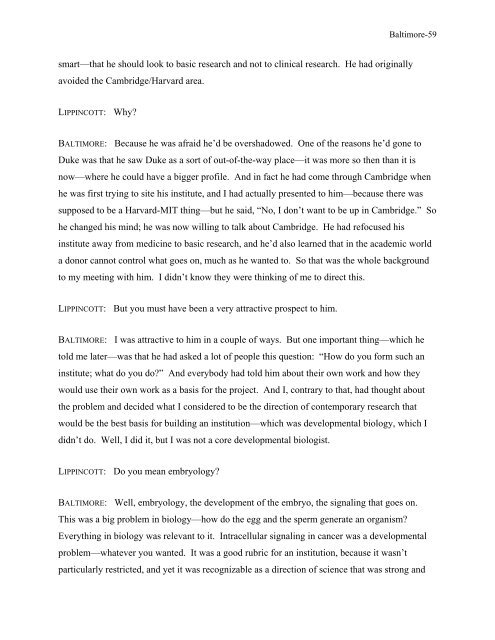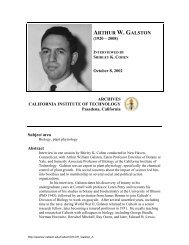Interview with David Baltimore - Caltech Oral Histories
Interview with David Baltimore - Caltech Oral Histories
Interview with David Baltimore - Caltech Oral Histories
You also want an ePaper? Increase the reach of your titles
YUMPU automatically turns print PDFs into web optimized ePapers that Google loves.
<strong>Baltimore</strong>-59<br />
smart—that he should look to basic research and not to clinical research. He had originally<br />
avoided the Cambridge/Harvard area.<br />
LIPPINCOTT: Why<br />
BALTIMORE: Because he was afraid he’d be overshadowed. One of the reasons he’d gone to<br />
Duke was that he saw Duke as a sort of out-of-the-way place—it was more so then than it is<br />
now—where he could have a bigger profile. And in fact he had come through Cambridge when<br />
he was first trying to site his institute, and I had actually presented to him—because there was<br />
supposed to be a Harvard-MIT thing—but he said, “No, I don’t want to be up in Cambridge.” So<br />
he changed his mind; he was now willing to talk about Cambridge. He had refocused his<br />
institute away from medicine to basic research, and he’d also learned that in the academic world<br />
a donor cannot control what goes on, much as he wanted to. So that was the whole background<br />
to my meeting <strong>with</strong> him. I didn’t know they were thinking of me to direct this.<br />
LIPPINCOTT: But you must have been a very attractive prospect to him.<br />
BALTIMORE: I was attractive to him in a couple of ways. But one important thing—which he<br />
told me later—was that he had asked a lot of people this question: “How do you form such an<br />
institute; what do you do” And everybody had told him about their own work and how they<br />
would use their own work as a basis for the project. And I, contrary to that, had thought about<br />
the problem and decided what I considered to be the direction of contemporary research that<br />
would be the best basis for building an institution—which was developmental biology, which I<br />
didn’t do. Well, I did it, but I was not a core developmental biologist.<br />
LIPPINCOTT: Do you mean embryology<br />
BALTIMORE: Well, embryology, the development of the embryo, the signaling that goes on.<br />
This was a big problem in biology—how do the egg and the sperm generate an organism<br />
Everything in biology was relevant to it. Intracellular signaling in cancer was a developmental<br />
problem—whatever you wanted. It was a good rubric for an institution, because it wasn’t<br />
particularly restricted, and yet it was recognizable as a direction of science that was strong and

















